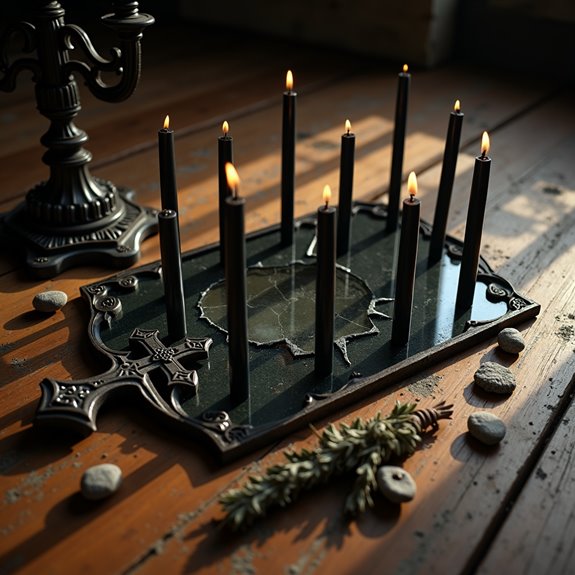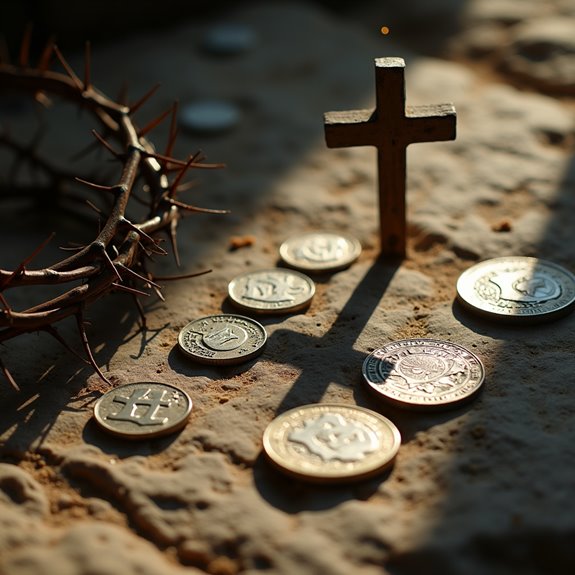Friday the 13th Superstition
Every year, millions of people alter their plans when Friday falls on the 13th. They’ll postpone surgeries, cancel flights, and avoid major business deals. This widespread fear costs the economy nearly a billion dollars in lost productivity. But what’s transformed an ordinary date into Western culture’s most dreaded day? The answer traces back through centuries of mythology, religious tradition, and historical disasters that’ve created a superstition more powerful than logic itself.
Historical Origins and Ancient Mythology Behind the Fear

While historians can’t pinpoint exactly when Friday the 13th became synonymous with bad luck, they’ve traced the superstition’s roots to a fascinating blend of Norse mythology and Christian tradition. In Norse legend, the trickster god Loki crashed a dinner party in Valhalla as the unwelcome 13th guest, ultimately causing the death of the beloved god Balder. Christianity’s contribution stems from the Last Supper, where Judas became the 13th person at the table before betraying Jesus, who was crucified on a Friday.
Medieval Europe intensified these fears when King Philip IV of France arrested the Knights Templar on Friday, October 13, 1307. This combination of religious symbolism and historical events cemented the date’s ominous reputation in Western culture.
The Norse Legend of Loki and the Unlucky Number 13

The Norse myth that helped spawn the Friday the 13th superstition centers on a fateful feast in Valhalla where twelve gods had gathered for dinner. Loki, the trickster god, arrived uninvited as the thirteenth guest. He orchestrated the death of Balder, the beloved god of light and purity, by tricking the blind god Höðr into throwing a mistletoe-tipped spear at him. Balder’s death plunged the world into darkness and mourning, marking the beginning of Ragnarök’s prophecy.
This tragedy forever linked the number thirteen with misfortune in Norse culture. The story’s influence spread throughout Scandinavia and eventually merged with Christian traditions that also viewed thirteen as unlucky, particularly due to Judas being the thirteenth guest at the Last Supper. These parallel myths reinforced each other, cementing thirteen’s reputation as a harbinger of doom.
Biblical Connections and Christian Interpretations

Beyond Norse mythology, Christianity’s most infamous dinner party reinforced the number thirteen’s sinister reputation through the story of the Last Supper. Thirteen people sat at the table—Jesus and his twelve apostles—before Judas Iscariot betrayed Christ, leading to the crucifixion on Good Friday. This connection between thirteen guests and tragic betrayal cemented the number’s association with misfortune in Christian culture.
Medieval Europeans wouldn’t seat thirteen people together at dinner tables, fearing one would die within the year. Churches spread this belief through sermons and teachings, warning congregations about the number’s dark significance. Some biblical scholars also note that tradition holds Jesus died on a Friday, linking the day itself to sorrow and sacrifice. These religious interpretations merged with existing pagan fears, creating a powerful cultural taboo that’s persisted for centuries.
The Knights Templar Massacre Theory
Historical events have also shaped Friday the 13th’s dark reputation, particularly through one of medieval Europe’s most dramatic power struggles. On Friday, October 13, 1307, France’s King Philip IV ordered the arrest of the Knights Templar throughout his kingdom. He’d grown deeply indebted to the wealthy military order and coveted their vast treasures.
French authorities seized hundreds of Templar knights simultaneously at dawn, charging them with heresy, blasphemy, and other fabricated crimes. They tortured many members to extract false confessions. The order’s Grand Master, Jacques de Molay, was later burned at the stake in 1314.
This coordinated assault effectively destroyed one of Christianity’s most powerful organizations. Some historians believe this catastrophic event permanently linked Friday the 13th with misfortune in Western consciousness, though the superstition’s origins likely predate this massacre.
Economic Impact and Business Losses on Friday the 13th
While ancient massacres and religious persecution shaped the superstition’s origins, Friday the 13th now costs the modern economy between $800 million and $900 million in lost business each time it occurs. Airlines report significant drops in bookings, with some carriers experiencing 10-15% fewer passengers. Hotels see similar cancellation spikes, particularly for weddings and major events.
The phenomenon, called paraskevidekatriaphobia, affects roughly 17-21 million Americans who won’t conduct normal business on these dates. They’ll postpone surgeries, avoid signing contracts, and skip major purchases. Stock markets historically show decreased trading volumes, though actual performance doesn’t correlate with the date. Some businesses capitalize on the fear, offering special discounts to attract customers who’d otherwise stay home. The Stress Management Center estimates that businesses lose productivity as anxious employees call in sick.
Psychological Effects and Behavioral Changes
Fear of Friday the 13th triggers measurable physiological responses that mirror those found in other anxiety disorders. People experiencing paraskevidekatriaphobia show elevated cortisol levels, increased heart rates, and heightened blood pressure when the date approaches. Brain scans reveal amygdala activation patterns similar to those seen in patients with specific phobias.
Behavioral modifications become apparent as the 13th nears. Individuals reschedule medical procedures, postpone travel plans, and avoid major decisions. Some won’t leave their homes entirely. Traffic studies show decreased highway usage, while workplace attendance drops by 2-3%. Airlines report booking decreases of up to 20% for Friday the 13th flights.
Psychologists note that anticipatory anxiety often exceeds the actual day’s distress. The fear becomes self-fulfilling when nervous behaviors increase accident likelihood through distraction and overcaution.
Notable Disasters and Events That Occurred on Friday the 13th
The self-reinforcing nature of Friday the 13th fears gains strength when actual disasters coincide with the date, creating memorable events that seem to validate the superstition. On September 13, 1940, Buckingham Palace suffered extensive bombing damage during the London Blitz. The Costa Concordia cruise ship ran aground on January 13, 2012, killing thirty-two passengers off Italy’s coast. Flight 571 crashed in the Andes on October 13, 1972, forcing survivors into cannibalism.
Wall Street’s mini-crash occurred on October 13, 1989, when the Dow Jones dropped nearly seven percent. Cyclone Bhola struck Bangladesh on November 13, 1970, killing approximately 500,000 people. The Knights Templar’s mass arrest happened on October 13, 1307, giving rise to the date’s negative associations. These events don’t prove causation, but they’ve cemented Friday the 13th’s ominous reputation in collective memory.
Cultural Variations and Global Perspectives on the Superstition
Although Western cultures widely recognize Friday the 13th as unlucky, this superstition doesn’t hold universal significance across the globe. In Spanish-speaking countries, Tuesday the 13th carries the ominous reputation instead, with the saying “En martes, ni te cases ni te inicie” (On Tuesday, don’t get married or initiate a journey). Italy shares this Tuesday superstition, particularly avoiding the number 17.
Asian cultures don’t typically fear Friday the 13th. China considers the number 4 unlucky due to its pronunciation resembling “death,” while 13 isn’t problematic. Japan’s adopted some Western superstitions but traditionally fears the number 9 instead.
Greece and Romania view Tuesday the 13th as particularly unlucky, linking it to Constantinople’s fall. Meanwhile, some cultures consider 13 fortunate—ancient Egyptians associated it with the afterlife’s joyful transformation.
Frequently Asked Questions
How Many Friday the 13THS Occur in a Calendar Year?
A calendar year always has at least one Friday the 13th and can’t have more than three. This happens because the 13th day of any month will fall on different weekdays throughout the year’s twelve months.
What Should You Do if Your Wedding Falls on Friday the 13TH?
If someone’s wedding falls on Friday the 13th, they shouldn’t worry about superstitions. They can embrace the unique date, offer fun themed favors, or simply focus on celebrating their love since the date doesn’t determine happiness.
Are Babies Born on Friday the 13TH Considered Unlucky?
Most people don’t consider babies born on Friday the 13th unlucky. While some superstitious individuals might worry, there’s no evidence these children face different outcomes. Many parents celebrate their child’s unique birthdate as special rather than unfortunate.
Which Months Are Most Likely to Have a Friday the 13TH?
Any month starting on Sunday will have Friday the 13th. This happens most frequently in January and October, which each can’t go more than six years without one. February, March, and November also commonly feature them.
Can Friday the 13TH Superstition Be Cured or Overcome Through Therapy?
Yes, therapists can help people overcome Friday the 13th superstition through cognitive behavioral therapy. They’ll identify irrational thoughts, challenge catastrophic beliefs, and use exposure techniques to reduce anxiety. Most patients successfully conquer this fear.


